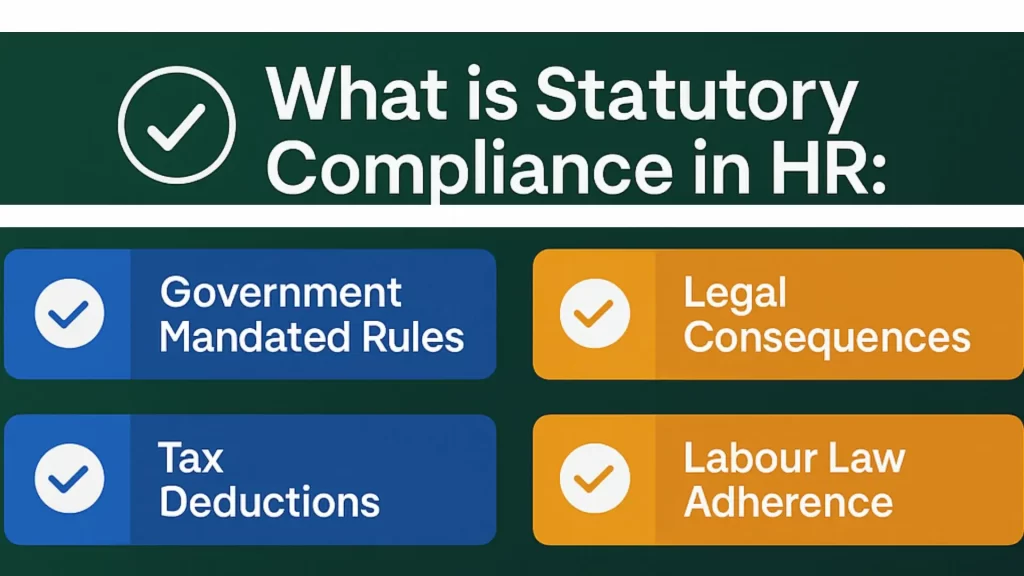What is Statutory Compliance in HR: 7 Powerful Insights You Need to Know


Table of Contents
What is Statutory Compliance in HR
At its core, what is statutory compliances in HR refers to adhering to the legal frameworks and labor laws that govern employee management. Companies must comply with various laws concerning wages, working conditions, social security, and more.
Knowing what is statutory compliances in HR ensures businesses operate within legal boundaries while safeguarding employee rights.
Why Understanding Statutory Compliance is a Game-Changer
Asking what is statutory compliance in HR unveils critical benefits:
It protects businesses from hefty penalties.
It fosters a culture of trust and transparency.
It enhances brand reputation among employees and stakeholders.
When you grasp what is statutory compliance in HR, you set your company up for sustained success.
Key Laws Involved in Statutory Compliance
To fully answer what is statutory compliances in HR, you must understand the key regulations:
1. The Payment of Wages Act, 1936
Ensures timely and fair payment of wages.
2. The Employees’ Provident Funds and Miscellaneous Provisions Act, 1952
Secures employee savings through mandatory provident fund contributions.
3. The Minimum Wages Act, 1948
Guarantees employees receive fair minimum wages.
Each law is a critical pillar in understanding what is statutory compliance in HR.

The Role of HR in Managing Statutory Compliance
Another important aspect of what is statutory compliances in HR is HR’s active role in it.
HR responsibilities include:
Monitoring labor law changes.
Maintaining correct employee records.
Filing accurate compliance reports.
Mastering what is statutory compliances in HR makes HR professionals more strategic and effective.
How Non-Compliance Affects Businesses
Ignoring what is statutory compliances in HR can lead to:
Financial penalties.
Legal lawsuits.
Reputational damage.
Understanding what is statutory compliances in HR helps businesses avoid these serious consequences.
Benefits of Strong Statutory Compliance Practices
Still asking yourself what is statutory compliances in HR? Look at these advantages:
Streamlined HR operations.
Higher employee satisfaction.
Increased organizational resilience.
By mastering what is statutory compliances in HR, companies enjoy a smoother ride toward growth and sustainability.
Challenges in Managing Statutory Compliance
Despite the benefits, learning what is statutory compliances in HR also highlights challenges like:
Ever-changing legal updates.
Complexity across different states.
Resource-intensive compliance audits.
Addressing these hurdles requires a solid understanding of what is statutory compliances in HR.
Best Practices to Master Statutory Compliance
If you truly want to understand what is statutory compliances in HR, adopt these best practices:
Invest in compliance management software.
Regularly train HR staff on labor laws.
Partner with legal experts when needed.
With these strategies, what is statutory compliance in HR becomes much easier to manage.
Real-World Examples of Statutory Compliance in HR
Understanding what is statutory compliances in HR comes alive with real examples:
Example 1:
A company automatically deducts EPF contributions from salaries to comply with The Employees’ Provident Fund Act.
Example 2:
A firm ensures women employees are paid equally under The Equal Remuneration Act.
These actions illustrate what is statutory compliances in HR in day-to-day business operations.

Technologies That Help with Statutory Compliance
In today’s digital world, what is statutory compliances in HR is easier with tech tools:
Compliance tracking software.
Automated reporting systems.
Cloud-based HR solutions.
These tools streamline the complexities associated with what is statutory compliances in HR.
Why Training HR Professionals on Compliance Matters
If you ask what is statutory compliances in HR, the training aspect cannot be ignored.
HR staff must be:
Up-to-date with latest legal changes.
Skilled in recordkeeping.
Proactive in compliance management.
Training builds confidence in managing what is statutory compliance in HR responsibilities.
Common Mistakes Companies Make with Compliance
Learning what is statutory compliances in HR also involves recognizing mistakes:
Inaccurate payroll processing.
Missing compliance deadlines.
Poor documentation.
Avoiding these errors reinforces strong understanding of what is statutory compliances in HR.
The Future of Statutory Compliance in HR
The future of what is statutory compliances in HR looks promising:
AI-driven compliance monitoring.
Real-time labor law updates.
Enhanced employee self-service portals.
Organizations that understand what is statutory compliances in HR today will dominate tomorrow’s HR landscape.
Outsourcing Statutory Compliance: Is It Worth It?
Wondering if you should outsource what is statutory compliance in HR?
Benefits include:
Access to expertise.
Cost-effective compliance management.
Reduced risks.
Deciding whether to outsource depends on how well you understand what is statutory compliance in HR internally.
Key Documents Involved in Statutory Compliance
Another vital part of what is statutory compliance in HR is paperwork:
Salary slips.
Provident fund reports.
ESI filings.
Keeping these documents ready ensures you are fully aligned with what is statutory compliance in HR.

Top Industries with Strict Compliance Needs
If you’re exploring what is statutory compliance in HR, these industries lead the way:
Manufacturing.
IT and Software.
Healthcare.
Each sector must handle what is statutory compliance in HR differently, based on the workforce size and operational scale.
How Global Companies Handle Statutory Compliance
Multinationals dealing with what is statutory compliance in HR focus on:
Local law integration.
Standardized compliance policies.
Cross-border labor law expertise.
A global view deepens your understanding of what is statutory compliance in HR.
Practical Tips to Boost Compliance Awareness Among Employees
Part of answering what is statutory compliance in HR involves internal education:
Regular workshops.
Compliance handbooks.
Engaging e-learning modules.
Building awareness strengthens every aspect of what is statutory compliance in HR.



